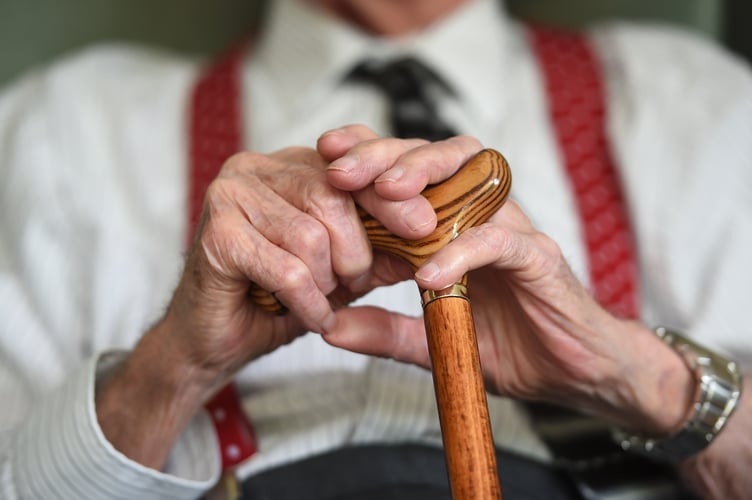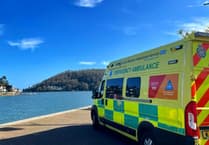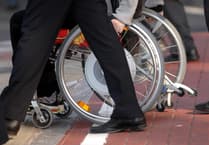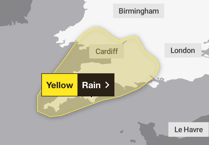More than 10,000 people in Devon had a dementia diagnosis through the NHS as of July, recent figures show.
September is World Alzheimer's Month, which the Alzheimer's Society described as "a global opportunity to raise dementia awareness and support people affected by the disease".
The charity welcomed the increasing number of people receiving a dementia diagnosis across England, but called for "bold, ambitious action" to ensure equal access to diagnosis and care across the country.
Figures from NHS England show 12,683 people in the NHS Devon Integrated Care Board area received a dementia diagnosis as of the end of July – up 4% from 12,225 a year earlier.
Of those, about 4,750 (37%) had been diagnosed with Alzheimer's disease.
Across England, 506,549 patients had a recorded diagnosis of dementia at the end of July.
It corresponds to about 0.8% of the population, and marked a 3% increase from 490,163 at the same point in 2024.
The largest proportion were diagnosed with Alzheimer's, at 42%. It was followed by 28% with unspecified dementia, 15% with vascular dementia, and 8% with mixed dementia types.
The figures also show just 66% of people aged 65 and older who are estimated to have dementia in England had a diagnosis recorded at the end of July. It was up from 65% a year earlier.
But this varied significantly across the country: while the highest diagnosis rate reached 76% in South Yorkshire at the end of July, the lowest was 56% in Somerset and also in Herefordshire and Worcestershire.
In Devon, this figure stood at 59%.
Tim Baverstock, head of local systems influencing at Alzheimer’s Society, said: "Behind every dementia diagnosis is a person and a family who can finally get the answers and help they need.
"That’s why it’s encouraging to see more people receiving a diagnosis, as it’s the first step towards understanding what’s happening, planning for the future, and unlocking vital care, support, and treatment."
But he called for "equal access" to dementia diagnosis and care across England, adding "without a diagnosis, people can be left to cope alone, risking avoidable crises and hospital admissions".
He explained regional variations in the diagnosis rate can be the result of differences in the number of trained staff, specialist test availability and how well-equipped local services are.
"That’s why we need bold, ambitious action, including renewed national and local targets, long-term investment in diagnostic tools and workforce, and sharing best practice so that everyone, wherever they live, has the same chance of getting an early and accurate diagnosis and the support it brings," he added.
"World Alzheimer’s Month is a reminder that dementia isn’t slowing down – and neither can we.
"If you’re worried about yourself or a loved one, Alzheimer’s Society’s dementia symptoms checklist is a helpful first step in starting a conversation with your GP."
Dr Jeremy Isaacs, NHS England's national clinical director for dementia, said: "Thanks to patients and families coming forward, and the hard work of NHS staff, we have a record more than half a million people diagnosed with dementia, many of whom are living in their own homes with support from family and friends.
"There are lots of reasons why people might be forgetful or absent-minded but it could be the sign that something is wrong.
"Getting a diagnosis of dementia is the first step in supporting people, with a wide range of NHS services able to help.
"If you have noticed that someone has symptoms, please encourage them to visit their GP for an assessment – the sooner someone is seen the quicker the NHS can help."
Minister of State for Care Stephen Kinnock said: "I know too well how cruel dementia can be and the terrible impact it has on families.
"As we mark World Alzheimer’s month this September, it is good to see progress has been made with almost two thirds of 65+ year olds estimated to have dementia have received a diagnosis.
"I recognise how timely diagnosis is crucial to insuring people can access the appropriate treatment and support they need, which is why we have invested nearly £11 million to develop new digital approaches for the timely detection and diagnosis of dementia.
"We will also publish the first ever framework for frailty and dementia to deliver fast and significant improvements in quality of care.
"Through our Plan for Change we are improving diagnosis rates, care planning and delivering better services for patients."
If you're affected by dementia or worried about a diagnosis, or if you care for someone with dementia, please contact the Dementia Support Line at 0333 150 3456.




